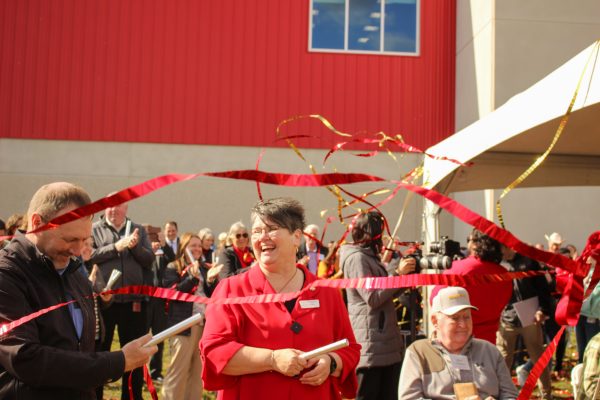Sioux City parents join in gay marriage case
August 11, 2008
From the Sioux City Journal
SIOUX CITY, Iowa — On a late July evening, the parents bathe their two children, putting them into pajamas just before 8 p.m.
The couple then spend time playing with their boys, talking a bit about how exhausting parenting can be and how parenthood limits the trips away they can take.
One leans over to help 1-year-old Reed blow his nose while the other rolls a ball with Ta’John, age 3. Ta’John, they say, will invariably come down from his upstairs bedroom five times nightly before finally falling asleep.
Its an otherwise ordinary life filled with laundry, work on the house and lawn and dining at home on chicken and rice.
Yet, in the eyes of many, the family forged by Chuck and Jason is anything but ordinary. While their home life may be “boring,” the two are also the plaintiffs Swaggerty and Morgan in a groundbreaking gay marriage case making its way through the Iowa court system.
“It’s funny that we’re newsworthy,” Jason Morgan said.
They met 10 years ago when Morgan was 28 and living in Sioux City and Chuck Swaggerty was in Waterloo. The two, who work in the telecommunications field, say they quickly knew they had the stuff of a good relationship.
Swaggerty moved to Sioux City, and for nearly six years they have lived in an economically and ethnically mixed near-northside neighborhood.
“I think we have a lot in common. We have similar goals. We both love antiques and love old movies. We have a lot of fun collecting and traveling,” said Swaggerty.
“Our biggest hobby is, we buy and sell antiques on the side. Our dream job would be to own an antique store,” Morgan said.
They have one bigger goal in mind — to be legally married in Iowa.
National gay rights organization Lambda Legal filed a lawsuit in December 2005 in Polk County District Court challenging Iowa’s ban on same-sex marriages on behalf of Morgan and Swaggerty and five other couples. A Polk County District Court judge in August 2007 ruled the same-sex ban is unconstitutional, but that ruling is now on appeal to the Iowa Supreme Court.
A civil union won’t cut it, Morgan says. Heterosexual couples wouldn’t be content to have only a civil union, he says, so why should they?
“A lot of people don’t quite get why it’s so important to get married,” Morgan said. “You live together as a family anyway, so what’s the big deal with the legal document?”
Swaggerty, a Wisconsin native, said legal marriage and the rights that come with it would also protect their family.
Morgan, who grew up in Sioux City and graduated from North High School, recently decided to work part time to help handle family matters and lost his health insurance. He can’t be covered by Swaggerty’s insurance as a spouse could.
“Here we are, 10 years together, two kids together and yet somebody can be married for a month and they can have insurance at their jobs and we can’t,” Swaggerty said. “But it’s really more than that. … Marriage, it is really more about love and family.”
Support far from universal
Above Swaggerty and Morgans fireplace, a phrase is painted: “A House is Built With Boards & Beams/ A Home is Built With Love & Dreams.”
The two spend considerable time working on their home, which was in such poor condition when they bought it that it was on the verge of being red-tagged. While first fixing up the home, they joked that the nursery would be upstairs, Morgan said, never thinking they would actually adopt children.
“And then it became the nursery,” he said.
Adopted sons Reed and Ta’John are biological brothers, and Reed came into their lives at 2 days old.
“Their mother has told me she is happy they have two parents who love and care for them, and she supports our marriage lawsuit,” Jason says.
But many people do not.
Many Iowa lawmakers point to the need to put a gay marriage ban before voters as a proposed constitutional amendment.
State Sen. Ron Wieck, R-Sioux City, said he, like most Republicans in the Iowa Senate, supports such an amendment. Wieck said state Sen. Dave Mulder, R-Sioux Center, worked a 2008 petition to get a proposed state amendment out of committee but didn’t get enough signatures to accomplish that after some lawmakers backed away from pledges to sign on.
Other gay marriage opponents, including DiAnn Rose of Mapleton, cite the Bible when discussing their opposition.
“I hope to never see (gay marriage). If it’s gotta come to pass, I hope it is after I’m long gone,” Rose said. “It goes against the Bible’s teachings.”
Rose said if a gay couple adopted children, “physically, they could do everything (in child rearing); emotionally, I don’t think it would be as good for the child.”
Morgan and Swaggerty attend St. Thomas Episcopal Church in Sioux City, where both boys were baptized. Many church members know the couple’s sexual orientation.
Gay marriage opponent John Fluit Jr. of Inwood also cites Biblical Scripture for his opposition to gay marriage, noting that the word sodomy arose out of the sin-filled city Sodom.
“We know what happened to Sodom and Gomorrah,” Fluit says.
“I am able to tolerate gay people,” he said. “I agree with tolerance, we don’t want to shun them. But I don’t know we want to be forced to accept (gay marriage). … This issue between tolerance and acceptance is a huge thing that never gets talked about.”
‘A huge change’
Initially, Morgan and Swaggerty intended to limit their political participation to being part of the push for changing the Sioux City discrimination ordinance, adding sexual orientation as one of the protected classes when it comes to employment, housing and public accommodation in the city.
That changed when city Councilman Dave Ferris spoke during a February 2004 discussion.
“If I pass this ordinance and in 10 years we see here what’s happening now in San Francisco, I’d throw up my guts,” Ferris said. “I don’t condone this lifestyle.”
Now, Ferris says, he “apologized within a week for those comments” and probably has apologized a dozen times publicly in the years since. He said those comments were spoken late at night after a long, tense meeting.
After the passage of four years and some changes in the City Council’s composition, adding sexual orientation and gender identity to the protected classes for city residents was approved by 4-1 vote on March 17, 2008. Ferris was in the majority, voting to bring the city’s ordinance into compliance with state law.
In 2007, Gov. Chet Culver signed into law a new prohibition against discrimination based on sexual orientation or gender identity.
“I only approved that ordinance this time around because it was mandated by the state. I still oppose it,” Ferris said.
Morgan said he was bitterly hurt by Ferris’ 2004 comments. After some discussion, he and Swaggerty decided “we needed to take a bigger step” and get involved with the Lambda Legal group in “reaching out for my own equality.”
As the council was debating the discrimination ordinance, the Community Alliance for Equality, or CAFE, was beginning to function. At one point many people in the alliance were hot on the issue at an early 2004 gathering at the downtown Jones Street Station gay nightclub. Morgan said many energized CAFE members were talking about multiple steps to pursue, but ultimately it was Swaggerty and Morgan who agreed to be part of a gay marriage test court case.
The decision to move into the legal — and political — limelight, Swaggerty said, wasn’t an easy one. They would be the only Northwest Iowa couple involved in the court case, and that meant “putting ourselves at risk,” Swaggerty said.
As the case began working it way through the system, religious groups sent them literature in the mail. Morgan has no doubt some neighbors may not support their gay marriage quest but says every Sioux City neighbor who has verbally expressed an opinion is fully behind them.
“By and large, we’ve gotten support from work, neighbors, family members,” Morgan said.
In a nation in which the divorce rate for years has been about 50 percent, Swaggerty said many of the gay couples he knows here have relationships of 15 years or more.
“We have a lot of friends who have been together 25 years,” he said.
Swaggerty and Morgan remain hopeful gay marriage will soon be considered mainstream.
Morgan said there has been “a huge change” in the acceptance of homosexuals and lesbians in his lifetime. He noted, for instance, the presentation of gays on television shows is increasingly more accurate and not the “Three’s Company” lampoon of Jack Tripper.
Said Swaggerty, “We are just people wanting the same rights as other people.”















